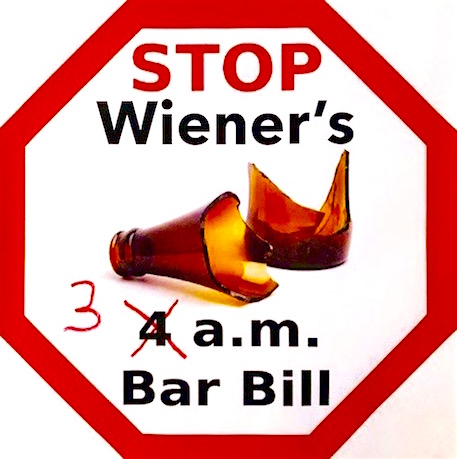Blog
Search
Reckless Late Night Bar Bill Fails Again
 In a resounding victory for prevention, SB 58, the 3 a.m. (nee 4 a.m.) bar bill was decisively voted down by the California State Assembly. The vote puts punctuation on a tumultuous fight by local health and safety advocates against a powerful state coalition of big nightlife concerns, centered around State Senator Scott Wiener. SB 58 marked the third time one of Sen. Wiener's bills extending last call failed. In 2017, the bill was turned into a study on the feasibility of extended bar hours, then pulled by its author. In 2018, a modified version of the bill was vetoed by then Governor Jerry Brown. This year, the bill was rejected on the Assembly floor. It remains to be seen if Sen. Wiener will bring it back in 2020.
In a resounding victory for prevention, SB 58, the 3 a.m. (nee 4 a.m.) bar bill was decisively voted down by the California State Assembly. The vote puts punctuation on a tumultuous fight by local health and safety advocates against a powerful state coalition of big nightlife concerns, centered around State Senator Scott Wiener. SB 58 marked the third time one of Sen. Wiener's bills extending last call failed. In 2017, the bill was turned into a study on the feasibility of extended bar hours, then pulled by its author. In 2018, a modified version of the bill was vetoed by then Governor Jerry Brown. This year, the bill was rejected on the Assembly floor. It remains to be seen if Sen. Wiener will bring it back in 2020."It was a powerful sign that this bill failed a simple Assembly vote," said Michael Scippa, Public Affairs Director of Alcohol Justice. "This wasn't just the action of one powerful politician. It was legislators speaking up for their constituents en masse."
The failure for SB 58 was helped along by a resolution from the Los Angeles City Council rejecting late last call times. This extraordinary gesture occurred flew in the face of the text of the bill, which specifically targeted Los Angeles for extended hours, and Mayor Eric Garcetti, who supported the bill. Shortly after the resolution passed, the bill was modified to shorten the extended hours from 4 a.m. to 3 a.m. But in light of the local opposition, even that proved insufficient to save the bill.
Mayra Jiménez, Advocacy Manager for Alcohol Justice, credited community groups, including members of the California Alcohol Policy Alliance, for spurring the City Council on. "The place was packed with advocates and allies," she said. "There were so many passionate people there to make their voices heard, and the councilmembers listened."
Concerns around extended last call times included greater risks of DUI, violence, crime, and injury. In July, the Berkeley-based Alcohol Research Group released a study examining the real costs of late-night alcohol service in Los Angeles. Its most conservative estimate showed over $50 million in annual costs from additional service. Over 5 years, the estimated net costs ranged from $266 million to over $1 billion.
Sen. Wiener has not yet expressed an intention to bring the bill back yet again in the coming legislative year. Despite the irregularities around reintroducing failed bills, he has brought his bar bill back on back-to-back-to-back years. If it comes to a fourth fight, however, the research, advocacy, and prevention community has no intention of going home early.
WATCH the video of the decisive vote--did your representative stand against alcohol harm?
READ MORE about the harms that come with extended bar hours.
READ MORE about the costs to Los Angeles from late last calls.
READ MORE about the ongoing fight for late night.
Concerns around extended last call times included greater risks of DUI, violence, crime, and injury. In July, the Berkeley-based Alcohol Research Group released a study examining the real costs of late-night alcohol service in Los Angeles. Its most conservative estimate showed over $50 million in annual costs from additional service. Over 5 years, the estimated net costs ranged from $266 million to over $1 billion.
Sen. Wiener has not yet expressed an intention to bring the bill back yet again in the coming legislative year. Despite the irregularities around reintroducing failed bills, he has brought his bar bill back on back-to-back-to-back years. If it comes to a fourth fight, however, the research, advocacy, and prevention community has no intention of going home early.
WATCH the video of the decisive vote--did your representative stand against alcohol harm?
READ MORE about the harms that come with extended bar hours.
READ MORE about the costs to Los Angeles from late last calls.
READ MORE about the ongoing fight for late night.
Help us hold Big Alcohol accountable for the harm its products cause.
| GET ACTION ALERTS AND eNEWS |
STAY CONNECTED    |
CONTACT US 24 Belvedere St. San Rafael, CA 94901 415-456-5692 |
SUPPORT US Terms of Service & Privacy Policy |
Copyright © 2026 Alcohol Justice. All Rights Reserved.
Joomla! is Free Software released under the GNU General Public License.


